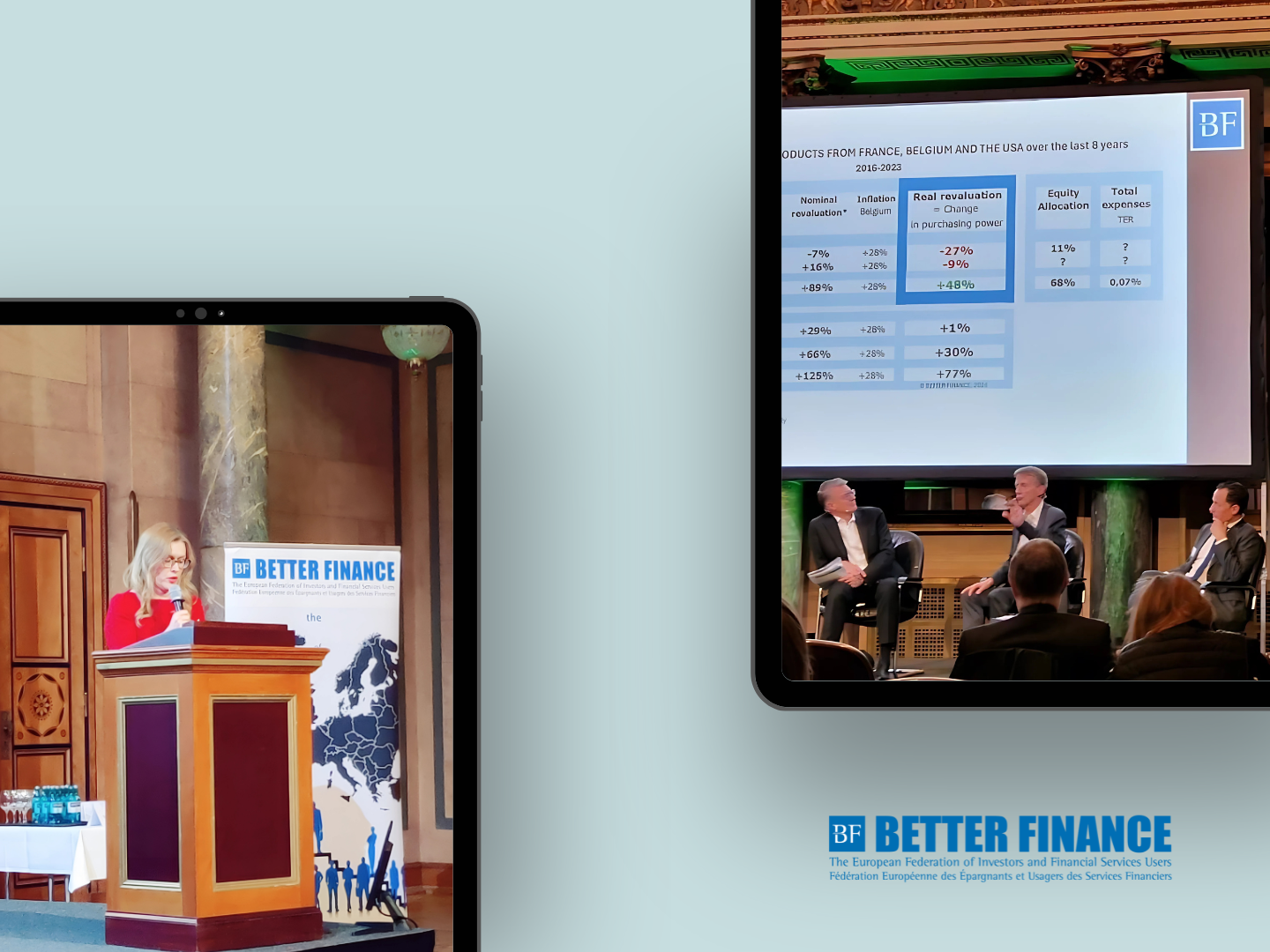
On 9 December, BETTER FINANCE, in collaboration with DSW, convened the International Investors’ Conference Europe at a Crossroads – Are We Still Competitive? in Wiesbaden. The high-level event gathered senior representatives from EU institutions, financial regulators, industry leaders, and academia to discuss Europe’s economic resilience and its strategic path toward enhancing global competitiveness through financial market integration and capital market development.
The conference opened with a candid assessment of Europe’s competitive standing, focusing on geopolitical tensions, economic fragmentation, and declining investment flows. Speakers highlighted the urgent need for €800 billion in targeted investment to secure Europe's future, advocating for the Savings and Investment Union (SIU) as a transformative policy platform aimed at mobilising €37 trillion in household financial assets for growth.
Before the panel discussions began, calls for streamlined regulations, transparent financial products, and reduced compliance burdens featured prominently.
Strengthening Europe’s Financial Resilience
The series of discussions started with a panel examining the policy reforms needed to drive sustainable growth. Regulatory fragmentation and the need for stabilising energy costs emerged as key themes.
During the discussion, proposals included creating a Pan-European Total Stock Market Index to boost equity investments and support small- and medium-sized enterprises (SMEs).
Experts stressed that fostering deeper capital market integration is essential for enhancing the EU’s financial resilience. They noted that fragmented regulatory frameworks across Member States hinder cross-border investments. Addressing these inconsistencies would enable more efficient capital allocation and reduce market uncertainty.
The EU Agenda 2024-2029: Capital Markets Union Reimagined
Guillaume Prache, Founder and Senior Advisor at BETTER FINANCE, delivered a powerful intervention during the panel discussion on the revamping of the Capital Markets Union (CMU). He provided a compelling assessment of Europe’s financial and economic challenges, urging immediate reforms to secure the continent’s future.
Prache painted a stark picture of Europe’s position, facing both external conflicts and internal stagnation. He highlighted the urgency to act decisively before the economic gap widens further.
He also noted, "Fifteen years ago, we had about the same GDP as the US. Today... we are about half." This sobering comparison underscores Europe’s relative economic decline. While the US has leveraged innovation, capital market depth, and robust savings allocation, Europe remains fragmented and underperforming.
Prache called for reform, specifically for:
- “Simpler, clearer, and principle-based rules”
- Improved private enforcement, highlighting the Wirecard scandal: "€20 billion of market cap vaporised... yet to see one cent of indemnification."
- Efficient savings allocation, as European savings remain stuck in low-yield vehicles, while the US directs 68% of retirement accounts to equity investments.
- A pan-European Total Stock Market Index
Prache also emphasised the need to mobilise individual investors and savers to drive equity flows, support small- and mid-cap businesses, and revitalise IPO activity in Europe.
Global Perspectives on Investor Engagement
The conference continued with a panel that explored investor engagement from an international perspective. In discussing how to foster investor trust and ESG-driven corporate governance, speakers stressed the importance of transparent sustainability reporting. The Corporate Sustainability Reporting Directive (CSRD) was highlighted as a promising yet complex framework requiring clear implementation standards.
Digital Transformation for Competitiveness
The last session of the conference explored how technological adoption can reinvigorate Europe’s competitive edge. Artificial intelligence (AI) integration, regulatory adaptability, and digital education took centre stage as essential means for sustaining technological leadership. Experts underscored the urgent need to close Europe’s digital skills gap, which continues to hinder growth in emerging technologies.
The role of corporate governance was a recurring theme, with calls for greater board-level responsibility in driving digital transformation. Success stories from companies leveraging AI for supply chain optimisation and customer engagement illustrated the potential of well-integrated digital strategies. However, regulatory frameworks must strike a balance between fostering innovation and ensuring data privacy and the ethical use of AI.
Closing Reflections and Future Imperatives
The conference concluded with closing remarks from Aleksandra Mączyńska, Managing Director at BETTER FINANCE, who reiterated the urgency of addressing persistent structural challenges within the EU’s financial ecosystem.
She emphasised the critical need to close the widening economic gap between Europe and global powers, noting that the proposals discussed were aligned with BETTER FINANCE and DSW's advocacy for simpler, principle-based rules and more efficient allocation of savings.
Mączyńska also highlighted the pressing issue of misallocated savings in low-yielding vehicles, stressing the importance of mobilizing individual investors to support small and mid-sized businesses and revitalise IPO activity.
During her speech, she urged the financial industry to address longstanding biases and conflicts of interest that hinder the distribution of retail investment products in Europe, warning that Europe's competitiveness will remain stagnant unless investor outcomes improve.
Ending on a positive note, Mączyńska expressed optimism about the ongoing dialogue with the European Commissioner for Financial Services, Ms Maria Luís Albuquerque, expressing hope that the discussions will lead to coordinated, bold actions to improve the investment climate in Europe.
